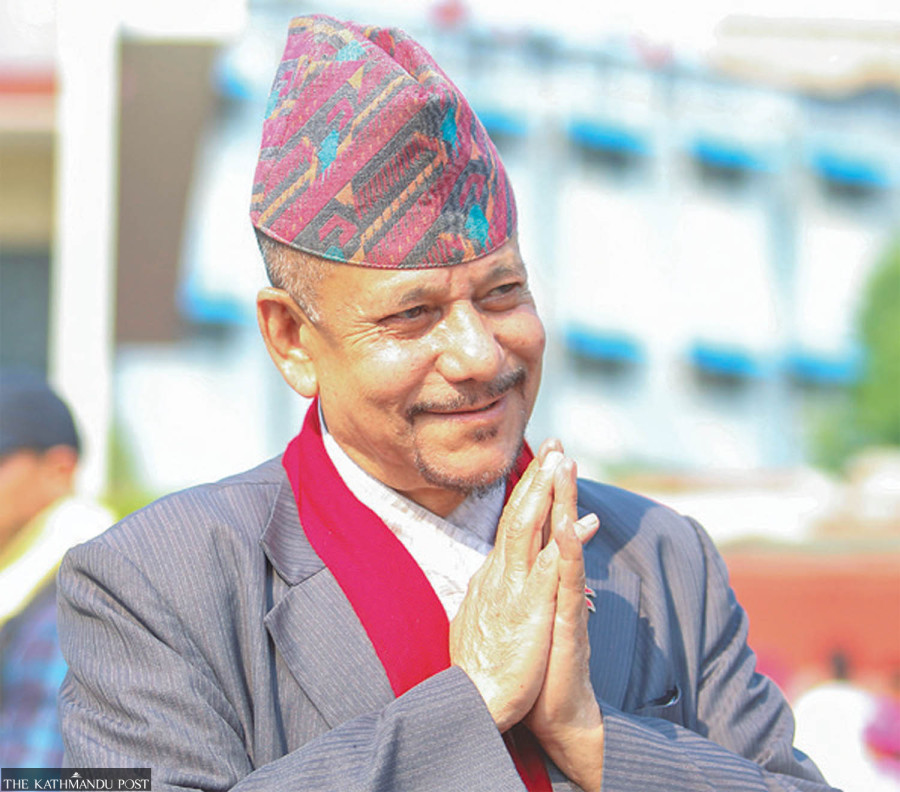National
Sthapit’s remarks, audience reaction put society’s view of women in focus
Concerns over safety and security of women under leadership of such patriarchal men.
Aakriti Ghimire
On April 28, in a hall filled with youths, five out of 56 mayoral candidates—Balen Shah (independent), Keshav Sthapit (CPN-UML), Rajan Koirala (independent), Samikshya Baskota (Bibeksheel Sajha Party) and Sushil Thapa (independent)—were invited to an interaction at National College, Kathmandu.
One of the panelists, Keshav Sthapit, has been accused of sexually harassing two women—a former journalist and a former staffer at the city office.
Inquiring about these allegations, Bhawana Raut, a member of the audience, questioned Sthapit’s integrity as a mayoral candidate.
Sthapit reacted aggressively and remarked, “You are a nice lady but thutuno thik chhaina”—condescendingly implying that Raut’s language was inappropriate.
An enraged Sthapit stood up and began wagging his index finger at her as he delivered the line, causing a commotion in the hall.
Video clips of the debate are making rounds on social media following Sthapit’s outburst.
Human rights activists are particularly taken aback by the crowd’s reaction instead.
Hooting. Claps. Heads nodding in agreement with Sthapit’s comments.
Many voices are heard suggesting Raut that the accusers should instead take this to the court, and that the way forward is fact-based, urging Sthapit to calm down.
A male voice in the background is heard saying, “This has derailed our debate.”
Women rights advocates and organisations say Sthapit’s remarks and the audience’s reaction collectively demonstrate that Nepali society still doesn’t consider women as equal members of society. That an episode such as this took place in this day and age is shocking, they say.
“This episode shows how women are perceived by our society, how they are treated or spoken to, even in public forums,” says Sunita Mainali, senior human rights and social justice campaign coordinator at Women Rehabilitation Centre (WOREC). “It shows the mindset of a large section of the Nepali society is still conservative. Until women aren’t considered equals to men and these social norms of how we interact with women aren’t changed, it will be a long fight.”
Comments on social media are divided.
While many have expressed disgust at Sthapit’s behaviour and have drawn analogies between former US President Donald Trump and him, a significant following commends Sthapit for his bravado. Women rights advocates who are active on social media platforms say they are appalled at the comments below the clips of the episode.
“When you read the comments, those who are applauding him are mostly men. I’m not sure if they are politically aligned but it normalises such behaviours,” says Bhagwati Adhikari, a women rights activist who has been working in the field for 16 years. “It gives them a leeway that they can speak whatever they wish to, wherever, however.”
Following Sthapit’s remarks, WOREC and 44 other women's rights organisations on Saturday released a joint statement demanding action against Sthapit.
Sthapit’s invective against Raut were “irresponsible, insensitive, uncivil and condescending,” the statement reads. “Such expressions are against the constitution and they mock years of feminist movements that have guaranteed women’s rights.”
The Election Commission has sought clarification from both Sthapit and WOREC.
Politically, women have advanced significantly over the years but social advancement has been largely ignored, say advocates. Despite rights guaranteed by the constitution for women, one of the most significant barriers to accessing those rights is the prevalent conservative mindset, they say.
“Legally, one can acquire citizenship from one’s mother’s name but why is the process filled with countless hurdles? What does it say about the perspective with which they look upon us women?” asks Mainali. “This mentality impacts both the process of making laws for women and their implementation. And it is evident that over the years we have seriously failed to change that mentality.”
While Nepal has national and international commitments to achieve gender equality, such remarks by prominent individuals in Nepali politics have highlighted the weak socio-political standing of women, activists say.
During that event, Sthapit also made remarks along the lines of—“Should I publish news saying this girl is into prostitution?”
In a previous interview, Sthapit referred to his accusers as retards.
Citing the way Sthapit speaks of and with women, women’s rights activists say that such men largely occupy spaces of power and politics in Nepal. The cheers and hoots from the public encourage individuals like Sthapit, they say.
“There’s a culture of supporting such men despite all the wrongs they have done, and are accused of. When they clap, they encourage them even further. And when the public supports them that way, they continue misbehaving,” says Bimala Tamang, vice-chairperson of the National Alliance of Women Human Rights Defenders.
Following Sthapit’s outburst, KP Sharma Oli, chairperson of CPN-UML, in a speech, extended support to the mayoral candidate. Such solidarity with political leaders accused of harassment should come as a warning bell among the public, women's rights advocates say.
“It’s scary to think that men like him are candidates for mayor,” says Adhikari. “There are a lot of men like Sthapit in our society. To think that they will decide for us and make policies for us horrifies me.”
Activists say they are gravely concerned about the safety and security of women under the leadership of such patriarchal men.
“How will anyone work under men like them?” asks Adhikari. “Who will guarantee their safety? Won’t the perspective towards women and girls become even more regressive and controlling because of men like them in power?”




 10.12°C Kathmandu
10.12°C Kathmandu















